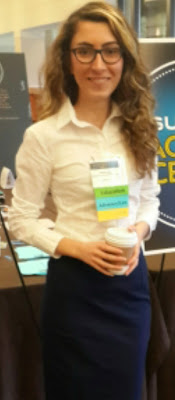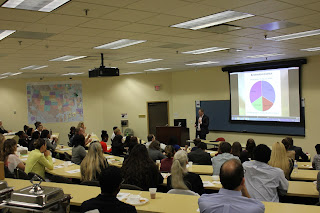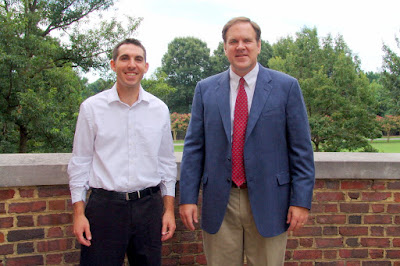There are more slaves in the world now than there has ever been in history — roughly 45.8 million. For some, that’s 45.8 million too many.
On Friday, March 23, Regent University’s School of Law hosted the 4th Annual Journal of Global Justice and Public Policy Symposium on Human Trafficking.
 |
The Symposium was hosted by the Journal of Global Justice and Public Policy;
the Center for Global Justice, Human Rights, and the Rule of Law;
and the Asian Pacific American Law Student Association |
Two panels of three speakers each presented findings, cases, issues and solutions surrounding the global industry.
The first provided an overview of the causes of human trafficking and the forms it takes both domestically and internationally — a bird’s eye view of sorts. The second took a closer look at the difficulties in combatting the issue locally.
 |
| Panel 1: International Sex and Labor Trafficking |
“It occurs everywhere in every part of society, in the wealthiest parts of society and the poorest parts of society, and all over the world,” said Dr. Jeffrey Brauch, Regent University School of Law LL.M. program director and executive director for the Center for Global Justice.
He believes human trafficking stems from a “basic problem about the way we see human beings.”
Organ trafficking, sex trafficking, labor trafficking and forcing children into soldiering are the main four forms.
“[Human trafficking] reflects the depravity of the human heart … that’s part of what takes place in human trafficking,” he said. “The other thing is, I think this can only occur in every form human trafficking, because people view others … as objects, to be used, to be bought, or sold.”
Among various social and economic issues, LAW alumna Sarah Breyer ’16 discussed how “cultural attitudes” toward people like women and children are a chief issue as they create an environment in which human trafficking thrives.
Her organization, Shared Hope, drafts a report in which each state in the United States is evaluated on its anti-human trafficking policy and laws, and provides a recommendation of positive steps law and policymakers can take.
They also equip ambassadors to educate others about the dangers of human trafficking and how to not only recognize it but also to protect their community from it.
“Informed communities mean informed families,” said Breyer. “Informed families can better protect their children, and those children can better protect their peers.”
Following Breyer, Laura Lederer of Global Centurion — an anti-human trafficking non-profit — shared findings on the health-related issues victims of trafficking experience; 99 percent have a general health problem, 95.1 percent experienced some form of physical violence, 88 percent undergo depression, and 84 percent admitted to abusing substances.
Aside from those, Laderer said 45 percent of trafficking victims attempt suicide, five times the rate of the national average.
LAW alumna Danielle Gallaher ’14 opened the second panel. In her talk, Gallaher, the Delaware County, Pennsylvania Assistant District Attorney for the Special Victims, discussed the struggles and triumphs a prosecutor faces when working cases pertaining to trafficking.
 |
| Panel 2: Domestica Human Trafficking from a Law Enforcement Perspective |
“I want to orient you guys to the prosecution of sex crimes in general,” said Gallaher. “If you don’t understand that dynamic, you’re not gonna understand sex trafficking.”
LAW alumnus Scott Alleman ’02 understands prosecution well — and human trafficking too.
“These types of cases really do have difficulties involved, even more so than a regular sexual assault one,” said Alleman, sharing experience from a 15-year career as a prosecutor working human trafficking cases. “Sexual assault cases are the most difficult to try as a prosecutor.”
As a prosecutor, Alleman said one of the greatest challenges he’s faced in these cases is the argument that a suspect’s actions were consensual.
Sometimes traffickers control their victims with fear and manipulation according to Alleman — manipulation to the extent that many sex workers and trafficked women involved in the cases he handled, defended their exploiters in court.
And sometimes, the money to be made, or the temporary and feigned affirmation pimp’s often offer, entice some to willingly become sex workers.
Regardless of their reason for entering the horrific industry, all “just want someone to say, ‘You’ve got value,’” said Alleman.
As a local combatant of human trafficking, Ebony Velasquez, the Human Trafficking Task Force coordinator for the Office of the Attorney General in the Commonwealth of Virginia, shared her experience working on the homefront in the Hampton Roads area.
Areas such as this, which experiences relatively heavy tourism and travel — Hampton Roads has an international airport and the third largest shipping port on the east coast — are prime targets for traffickers, Velasquz said.
“[Human trafficking] destroys a sense of community; it destroys the quality of life in that community,” said keynote speaker and School of Law professor Kathleen McKee.
 |
| Banquet Lunch with Regent Law Professor Kathleen McKee |
She compared the dilemma to, “a puzzle that doesn’t come with a picture on top.”
“For that puzzle to be fully assembled, it requires every person in this room to be informed and engaged,” McKee said. “Informed as to what trafficking is, informed as to who the other players in detecting trafficking are, and encouraging that they are trained to be able to detect the signs of human trafficking and engaged.”































